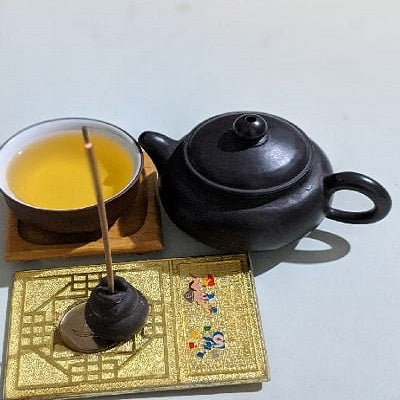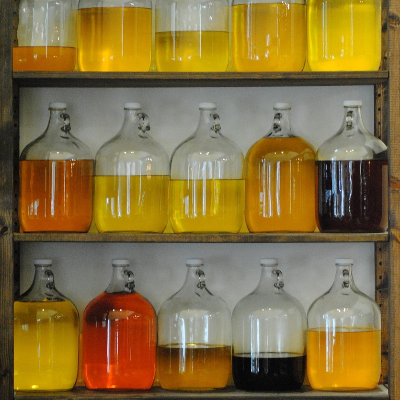Menu
-
-
F.A.Q
- How to identify genuine agarwood chip, natural or cultivated
- How to identify oil injection / absorption fake agarwood beads
- How to know if there are more than one oil in your oil
- How to make your wood bracelet or mala darker
- How to tell if an Agarwood bead sinks WITHOUT sinking it under water?
- How does back flow incense work and how do you burn it?
- Where to start if you don't know what agarwood is ?
- Why are you losing money if you buy seeds and plants?
- Which agarwood incense should I choose?
- Frequently Asked Questions
- Agarwood Related Articles
- Shipping
-
SHOP - Agarwood
-
SHOP - Other Fragrant Wood
-
SHOP - Incense Holder and Burner
-
- FREE Oud Oil guide
- Testimonials
- "Why did you buy this?"
- Contact us
- About Us
- +61430284329
- Login
-
English


How to enjoy your tea minute by minute WITHOUT adding anything into your tea
June 11, 2020 3 min read
A reminder from a mom (not my mom)
I went to a pharmacy last week to get some hand sanitiser. While waiting to checkout, I overheard a conversation between a mother and the little boy.
“Mommy I don’t want to drink this medicine, it is very bitter.”
“Don’t worry boy; you can use your finger to close your nose while drinking it with water. It will be over quick”
That reminded the experience as a kid. The doctor actually told me that when I complained about the bitterness.
Eventually, I did follow the doctor’s instruction: to hold my nose with my fingers and swallow the medicine as quick as I could.
Most of the time it worked wonderfully, I felt it was not so bad.
I wondered what happened if I did not hold my nose.
So one time, I decided to do an experience with a fish oil capsule.
I took a deep breath.
With my left hand, I used my index finger and my thumb to hold my nose.
With my right hand, I put the capsule into my mouth and…. bit it.
I did not taste anything but felt greasy oily.
But as soon as I released my finger and inhaled, I felt the fishy, and light sweetness in my mouth (I guessed from the capsule)
At that moment, I realised that If I could not smell something, I would not be able to taste something properly.
Scent affects taste
From this experience, I discovered that every time I drink my green tea while burning a fragrant wood incense, the tea somehow tasted better. Not just green tea but oolong tea, black tea or even English breakfast
It seems to be impossible, but let me explain.
In the book of “How flavour works.”
“If we closed our eyes and noses, and only relied on taste, it would be very difficult to distinguish an apple from an onion. Tastes play only 10% of the role in determining flavour, while flavours are the other 90%.”
There are five basic tastes that a human can detect: sweetness, umami (savoury), sourness, saltiness, and bitterness.
“From the five tastes, apples only have sweetness and sourness; and with just these two tastes, it is impossible for us to differentiate an apple from another food.”
Taste does not significantly influence the holistic flavor. The distinctive flavor of the apple is due to its unique odor profile. In fact, during the oral process of chewing an apple, its odorants
volatilise through the narrow air passage behind the throat that connects to the nose. The odorants are then associated with the two tastes of the apple and produce the final flavor of the apple. Thus we perceive the flavor of the apple by smelling it through our mouths”
So when you enjoy the tea, the aroma of the tea plays an important role. Without the aroma, you can only taste the bitterness.
If you knew Pu’er tea, you would expect some earthy and mellow note. However, these are the fragrance of the tea (felt by olfactory), not the taste (felt by tastebud). As Choi and Han 20515 said it, you perceived the flavour of the tea by smelling through your mouth. Are you still in doubt? The next time you drink your Pu’er tea, hold your breath and don’t inhale or exhale, just hold the tea inside your mouth and try to taste it. Let me know how you feel?
I let you know how I feel now: I am unable to feel any earthy aroma at all.
Since the fragrance will enhance flavour, you can use this theory in tea.
When you are burning incense while drinking tea, many things happen.
The purple clay teaware will improve your tea favour.
The smell of the fragrant wood incense will be an add on. You perceived your tea better, and because of that, you found it tasted better.
Overall, by burning incense, it enhances your tea drinking experience.
Want to feel the difference while drinking tea? Click here or see the below to get some agarwood incenses to improve your tea tasting experience today.
p/s: if you can't stand any smoke, then this method will not be for you.
You can try to diffuse essential oil in the aroma diffuser, it still works as well.
Leave a comment
Comments will be approved before showing up.


